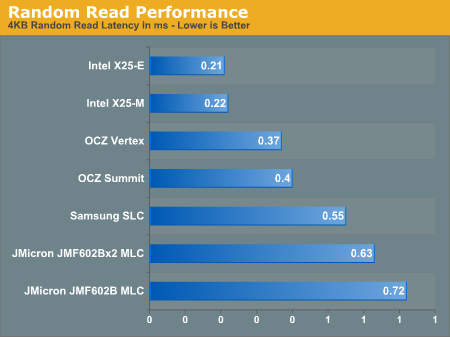The SSD Anthology: Understanding SSDs and New Drives from OCZ
by Anand Lal Shimpi on March 18, 2009 12:00 AM EST- Posted in
- Storage
SSD Aging: Read Speed is Largely Unaffected
Given the nature of the SSD performance-over-time “problem” you’d expect to only pay the performance penalty when writing files, not reading. And for once, I don’t have any weird exceptions to talk about - this is generally the case.
The table below shows sequential read performance for 2MB blocks on new vs. “used” SSDs. I even included data for a couple of the hard drives in the "Used" column; for those numbers I'm simply measuring transfer rates from the slowest parts of the platter:
| 2MB Sequential Read Speed | New | "Used" |
| Intel X25-E | 240.1 MB/s | |
| Intel X25-M | 264.1 MB/s | 230.2 MB/s |
| JMicron JMF602B MLC | 134.7 MB/s | 134.7 MB/s |
| JMicron JMF602Bx2 MLC | 164.1 MB/s | 164.1 MB/s |
| OCZ Summit | 248.6 MB/s | 208.6 MB/s |
| OCZ Vertex | 257.8 MB/s | 250.1 MB/s |
| Samsung SLC | 101.4 MB/s | |
| Seagate Momentus 5400.6 | 77.9 MB/s | - |
| Western Digital Caviar SE16 | 104.6 MB/s | 54.3 MB/s |
| Western Digital VelociRaptor | 118.0 MB/s | 79.2 MB/s |
The best SSDs still transfer data at over 2x the rate of the VelociRaptor.
Read latency is also extremely good on these worn SSDs:

I left the conventional hard drives out of the chart simply because they completely screw up the scale. The VelociRaptor has a latency of 7.2ms in this iometer test with a queue depth of 3 IOs; that's an order of magnitude slower than the slowest SSD here.
Since you only pay the overhead penalty when you go to write to a previously-written block, the performance degradation only really occurs when you’re writing - not when you’re reading.
Now your OS is always writing to your drive, and that’s why we see a performance impact even if you’re just launching applications and opening files and such, but the penalty is much less tangible when it comes to read performance.










250 Comments
View All Comments
VaultDweller - Wednesday, March 18, 2009 - link
I love it when people critique someone's critique of grammar... and get it wrong.It's an SSD, not a SSD.
gwolfman - Wednesday, March 18, 2009 - link
lolzsidex - Wednesday, March 18, 2009 - link
I would like to know the firmware version of Vertex used in your review. To me sounds the old 0112kensiko - Wednesday, March 18, 2009 - link
Yes that is important to know.I'm sure this is not done with the latest firmware available which is 1199. This version got better performance.
Firmware 1275 is coming also.
Anand, will you update your benchmarks with the latest firmware?
If not, then the benchmarks are obsolete.
Anand Lal Shimpi - Wednesday, March 18, 2009 - link
I tested with the shipping firmware for this article (0122). I've been playing around with 1199 in the lab and will most likely have an update in a couple of weeks once I've done a thorough evaluation of it. By then I should also have the final version of the new Samsung drive and maybe even some other interesting things.For now, I've got to get to work on the new Mac Pro and the updated Ion article :) I need a small break from SSDs por favor :)
Take care,
Anand
VaultDweller - Wednesday, March 18, 2009 - link
Awww, don't you have some underlings to do your SSD-related will?Would love to see an update, and would love to see Corsair's SSD drive tested as well (it's based on Samsung's last generation MLC controller, and doesn't seem to emphasize sequential like the Summit does).
Anand Lal Shimpi - Wednesday, March 18, 2009 - link
I will do an update on the new firmware, I just want to do it right so it'll take some time :)I'll put in a request for the Corsair drive as well :)
-A
Slash3 - Wednesday, March 18, 2009 - link
Page 29: "Not all applications will launch faster than a VelociRaptor on a SSD, but let's not forget that the VelociRaptor is the world's fastest hard drive."Really? What about the nice and speedy enterprise-level 15k SAS/SCSI drives everyone neglects to acknowledge? :)
George Powell - Wednesday, March 18, 2009 - link
I believe it refers to consumer drives. While SAS drives are beginning to be a possibility on the desktop with newer motherboards supporting them natively, the drives themselves are too expensive and too noisy for most consumers to actually want them.FishTankX - Wednesday, March 18, 2009 - link
Good info. However, I noticed one mistake.Second page
Samsung had a MLC controller at the time but it was too expensive than what SuperTalent was shooting for.